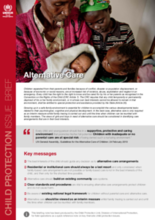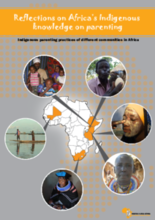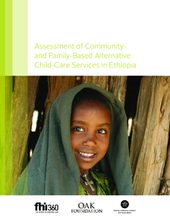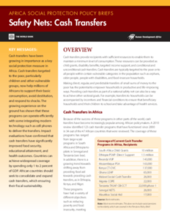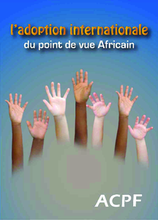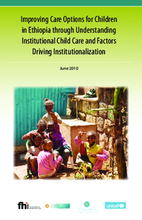childrens_living_arrangement
children_living_without_bio
Displaying 51 - 60 of 70
This issue brief from the UNHCR highlights key messages from UNHCR in regards to alternative care, including the importance of making alternative care arrangements based on the best interests of the child and using residential or institutional care only as a very last resort.
This publication, produced by the Parenting in Africa Network (PAN), highlights the skillful parenting practices of several pastoral communities in Africa.
This assessment conducted by FHI 360, with support from Ethiopia's Ministry of Women, Youth and Children Affairs (MoWYCA) and the OAK Foundation aimed to generate evidence about formal community and family- based alternative child care services and service providing agencies in Ethiopia, with a particular focus on magnitude, quality and quality-assurance mechanisms.
Using data from three rounds of the Young Lives longitudinal survey conducted in 2002, 2006, and 2009 in Ethiopia, this paper investigates whether the death of a parent during middle childhood has different effects on a child’s schooling and psychosocial outcomes when compared with death during adolescence.
This policy brief from the World Bank provides an overview of cash transfers in African countries.
This publication, published in French, was prepared as a background document to inform the discussions and debates during the Fifth International Policy Conference on the African Child held on 29-30 May 2012 in Addis Ababa, Ethiopia. This report examines the rationale behind increasing intercountry adoption in Africa, the main thrust of international standards, the extent and magnitude of African intercountry adoption and its problems and challenges. The paper provides recommendations to this increasing trend and aims to establish a more Pan-African position on the topic of intercountry adoption.
In this report, Retrak examines the situation of girls living on the streets in Kampala, Uganda and Addis Ababa, Ethiopia, and provides key recommendations on the development programs required to address their needs. The report urges for scaling up services, building new facilities for street girls, and building staff capacity to handle issues related to this population.
The study was carried out in Addis Ababa, Ethiopia. The purpose of this research is to utilise information collated from literature review as well as informant interviews and focus group discussions to identify good practices or help inform the development of such practices aimed at assisting street children currently residing in institutional care to return to a family-based environment.
This paper looks at how social protection is evolving in developing countries and how it relates to the vulnerabilities of children. It goes on to present the different conceptual models for protection and how they have changed and been influenced by the changing definition of poverty and the growth in transnational knowledge and policymaking.
Findings and recommendations of the first national study of its kind in Ethiopia to study child care institutions, institutionalized children, and factors driving institutionalization.

